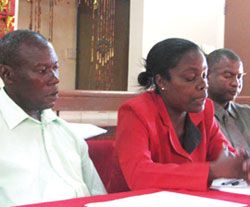Mixed reaction to union’s rest call

The success of the two-day industrial action taken by disgruntled school teachers is yet to be determined, and their actions have been met with mixed reactions.{{more}}
A survey by Searchlight Newspaper among members of the public shows that even though most persons are of the belief that teachers should be appropriately remunerated, most are not in support of their decision to take two days of ârest and reflectionâ at the beginning of the second term of school.
This was also reflected at a number of schools, where the usual complement of teachers and students turned out for school.
Public Relations Officer of the Union Oswald Robinson said that the first day of the industrial exercise was successful, with 90 per cent of teachers staying away from classes, and a 100 per cent absence at a number of schools.
The reports coming from the Ministry of Education indicate, however, that there was an average 80 per cent turnout of teachers at the more than 90 schools in the country, with two primary schools remaining closed.
The Ministry urged teachers and students to report to school as usual yesterday.
On Wednesday, January 09, Robinson indicated to Searchlight that the Executive of the Union would be regrouping following the two days of industrial action, during which they will strategize their next steps.
Robinson indicated that although the Union is prepared to continue the struggle, they are open to dialogue with the policy makers in an effort to bring things back to normal.
This weekâs industrial action followed a meeting on Monday between members of the Unionâs Executive body and Permanent Secretaries in the Ministries of Education (Laura Browne), The Public Service (Nathaniel Williams), and the Prime Ministerâs Office (Godfred Pompey); Director General of Finance and Planning (Maurice Edwards), as well as Marilyn Phills, Director of Public Service Reform.
According to the Union President Joy Matthews at a press conference on Tuesday, teachers are not satisfied with the results of the reclassification exercise and the Executive has a mandate to represent its members.
âAs a Union, we have a responsibility to ensure that our members are satisified. And if we have a work force that is satisfied, their production will be high and they will also be comfortable.â
As for the reclassification, Mathews said: âSince 1999 we were struggling for the implementation of reclassification, all the while appeasing members. We are stressed and shocked as well, so we need time to sit, to recuperate and maybe regroup and maybe ensure what we saw we really did not see it.â
Matthews said that the worth of the teaching profession has been reduced, and that the introduction of the universal access to secondary schools has brought with it many problems and much stress.
The Unionâs Industrial Officer Denniston Douglas indicated that teachers are in a worse position after reclassification with regard to the salary scale, a move he blames squarely on the government.
âWe took the Government at their word. We put a lot of trust into the relationship.â
âThe SVGTU and the PSU (Public Service Union) submitted a joint list of recommendations which was adopted by the steering committee and forwarded to Cabinet. Instead, the Government chose to implement the Powellâs Recommendations, which they claimed they could not have implemented in 2004 because it would have caused a riot. So what do they expect to happen now?â









